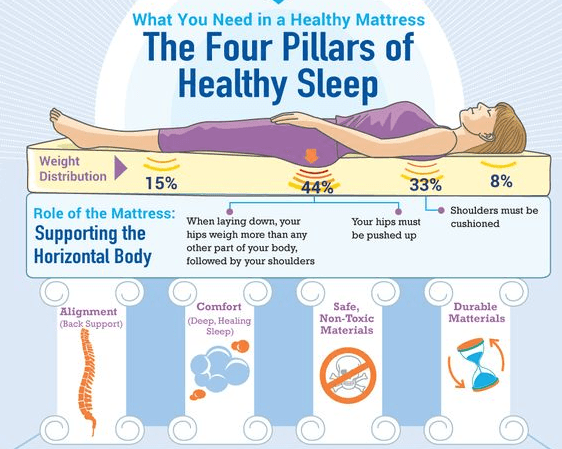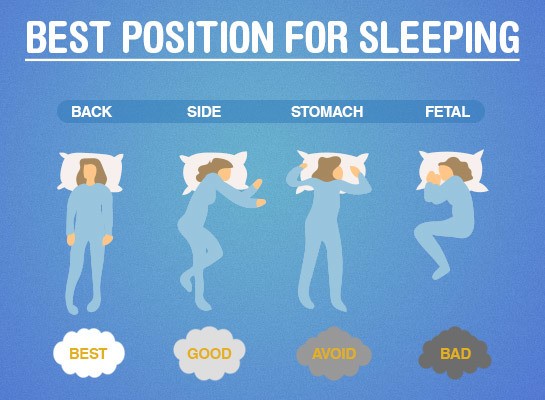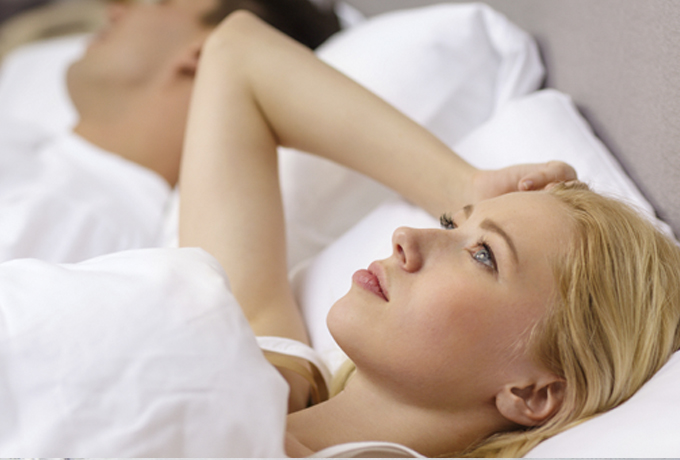There are a few lucky people out there who have no trouble falling asleep at night. The minute their head hits the pillow, they’re out. The rest of us lie in bed staring at the ceiling, tossing and turning, waiting for the mercy of blessed sleep to come.
Lack of sufficient and good quality sleep takes a toll on nearly every aspect of our lives, everything from health, to mood, to safety, to job performance. But with a bit of knowledge, a bit of planning, everyone can learn how to fall asleep fast.
In this article, you will learn everything you need to do since morning in order to fall asleep faster at night:
What to prepare during daytime
1. Wake up at the same time every day (don’t wake up later on weekends)
Your body follows a circadian rhythm,1 which sets you up to do the same sorts of activities at the same time every day.
Having a waking time that doesn’t change helps your body establish a pattern. Your body prepares to wake up 1-2 hours before you rise, and if it doesn’t know when you should wake up, you’ll have poor quality sleep.
2. Eat breakfast
When you first wake up, your body has been fasting since the night before. When it comes to food, our brains and bodies share many characteristics with early hominids. Eating breakfast tells our inner cave person that our basic needs for survival are being met.2
To make your day more energetic, eat healthy breakfast. Here’s a list of simple and tasty ideas for you: 31 Healthy Breakfast Recipes That Will Super Boost Your Energy
3. Don’t press the snooze button
Even though silencing your alarm for a few minutes can make you feel like you have some control over your day, hitting the snooze button can leave you feeling more tired than if you had just gotten up.3
When your alarm jolts you from your sleep and you commit to having 5 to 10 minutes of less-restful snooze-button sleep, you start your day off feeling sluggish.
4. Expose yourself to sunlight
The sun gets a lot of bad press, but we need to be exposed to few minutes of natural light every day.4
Thirty to sixty minutes of natural outdoor light can help our bodies create a sleep schedule. This is critical for us since our bodies may be inundated with confusing signals from artificial light. Enjoying the sun’s rays in moderation is like hitting the reset button for us.
5. Have enough protein and reach for complex carbs
Eating simple sugars (like those found in candy bars and processed foods) may give you a temporary energy boost, but the inevitable crash isn’t worth the momentary relief. Find out how sugar affects your performance in this article: 5 Ways Sugar Affects Your Mental Performance
Complex carbohydrates and proteins take longer to digest.5 Unlike simple carbohydrates, which cause your blood sugar to spike, complex carbs and protein contribute to stable blood sugar. You’ll be less likely to feel sleepy in the afternoon, which means you’ll be less likely to take a long afternoon nap or consume too much caffeine, both of which have a negative impact on your sleep.
I know carbs can be addictive, but here’s how you can deal with it: Are Carbs More Addictive Than Cocaine? (And How to Get Good Carbs)
6. Don’t eat too little or too much
You know that it is miserable to go to bed with your stomach growling, but eating too much can also make it difficult to get a good night’s sleep.
Many people eat too little throughout the day and gorge on a big meal at dinner time.6 Your digestive system has to work harder when you do this, which can lead to a restless night of discomfort and indigestion.
7. Avoid naps
Try not to nap if you possibly can. Sleeping during the day makes it difficult to fall sleep at night.
If you absolutely must, limit naps to a power nap of 20 minutes.
8. Limit beverages that interfere
We all know that caffeine makes it difficult to fall asleep, but we may not be aware that alcohol interferes as well, as does drinking too much water right before bedtime.
9. Exercise during the day
Exercise improves our health and also improves our sleep by reducing stress.
The caveat: don’t exercise within 3 hours before bedtime. The adrenaline will keep you awake. Check out the tips to get yourself moving here.
What to do in the evening
10. Mind what you eat.
Have a light dinner. Heavy meals may be difficult to digest and indigestion may make it difficult to fall asleep, but don’t go to bed hungry.
Hunger keeps you awake. Eat a light snack shortly before bedtime. Snacks like bananas, Greek yogurt and hummus will help you sleep better.
11. Turn off the TV and computer.
This kind of stimulation tells the brain to be alert when it’s supposed to be winding down and has been proven to reduce sleep quality.
How to prepare your bedroom atmosphere
12. Don’t make yourself able to see and check the clock
Feeling that you’re running out of time to get enough sleep fuels insomnia. Turn the clock away from you, and refrain from checking the time on your phone or watch after you’ve set your alarm.
The lights from electronic devices including your alarm clock can hinder melatonin production, a hormone which helps you fall asleep and feel rested.
13. Keep the alarm clock out of sight yet within reach
Just because you have the alarm clock out of sight doesn’t mean you need to banish it to some far off corner of your bedroom.
Place your clock within easy reach so that you don’t have to deal with the pressure chasing down a screeching alarm on the other side of the room first thing in the morning.
14. Don’t consume chocolate or ice cream
Most of us know better than to drink a soda or coffee before bed, but ice cream and chocolate are hidden sources of caffeine.
Darker chocolate, which is healthier for you, has a higher amount of caffeine than milk chocolate.
Coffee-flavored and chocolate ice cream also contain sleep-disrupting caffeine.
15. Remove the electronics
Make your bedroom a no-gadget-zone. Shut off the TV and remove computers and other electronic devices from your bedroom. They tempt you to engage in non-restful activities and keep you awake.
The bedroom is for sleep, not work and surfing the internet.
16. Keep the room cool
You fall asleep faster and sleep better if the bedroom is cooler. A lower room temperature lowers core body temperature, and helps you go to sleep. The ideal temperature for sleep is 65 degrees.
Find out more about what you can do to keep yourself at an optimal temperature for sleep here: How to Keep Your Body Temperature Low to Sleep Better
17. Sleep with a weighted blanket
A weighted blanket molds to your body like a warm hug. The pressure helps relax the nervous system and promotes deep, restful sleep. Typically the weight in the blanket is 15 to 30 pounds for adults.
18. Do quality bedding
Get a comfortable and supportive mattress. It’s worth the investment as you spend one-third of your life in bed.
Use comfortable soft sheets and comforter. Smooth, clean and quality bedding helps sooth and relax your body to fall asleep faster.
Here’s a simple infographic to help you find the mattress you need:

19. Dim the lights
Light, even a small amount interferes with sleep hormones and stimulates the brain.
Wear an eye mask if necessary or turn the alarm clock around.
20. Turn it down
Eliminate noise, or alternatively if you find noise soothing or need to block noise you can’t control, choose calming sounds such as white noise or ocean sounds.
Try not to use your phone or computer to play those sounds though, you may be tempted to use the devices!
Wearing earplugs can also help block unwanted noise.
21. Try aromatherapy
Aromatherapy soothes the body and has a calming effect. There are many scents available that can help you to relax and prepare for sleep. Vanilla, lavender, marjoram, sandalwood are just a few examples. Use these on your pillow, in the air, or in the bath.
Find out what different scents do to you here: Olfactory Life Hacks: Scents That Increase Brain Power
The fall-asleep-fast bedtime routine
22. Sleep and wake up at the same time every day
Start your bedtime routine at the same time each day and maintain a regular sleep time. It helps condition your body to fall asleep faster by creating a sleep habit and setting your circadian rhythm.
23. Try a warm bath
A warm bath can help you relax by raising your body temperature. When you get out of the bath, you’ll cool yourself in a low temperature room, which helps you fall asleep faster.
24. Drink a soothing beverage
Herbal tea or a glass of milk also relax the body and help you wind down.
25. Read anything that’s not thought-provoking
Read an entertaining or boring book. It helps to get your mind of worries and your to-do list.
Stay away from stimulating or self-help books though; they rev up your brain.
26. Stretch and relax your body
Try yoga or gentle stretching. Do progressive relaxation; tighten each muscle for a count of ten and then release. It will relax your body and minimize muscle aches and pains.
Watch this video and learn some simple stretching for better sleep:
27. Write out your thoughts
Write out your thoughts or try doodling. This will help to let go of your worries and busy thoughts.
28. Wear comfortable clothing
Wear loose, light and cool pajamas. Cotton works best as it minimizes nighttime sweating. Alternatively, sleep without pajamas if it makes you more comfortable. Sleeping naked actually brings you more benefits than you thought.
Binding or hot PJs make for restless and uncomfortable sleep.
29. Watch your posture
Sleep position matters too. Find a comfortable sleep position that supports good sleep posture. Make sure every part of your body is comfortable.
Buy a good quality pillow that supports your neck and properly aligns your body.
Side positions are usually better, especially on your left side. But if back works for you that’s fine. Lie in the same position every night, so your body becomes accustomed to falling asleep in the same way.

Stick to habits that help you sleep better
Falling asleep fast requires a bit of preparation, following a regular routine and paying attention to sleep comfort.
If you’re looking for tips to build a night routine, don’t miss this article: The Ultimate Night Routine Guide: Sleep Better and Wake Up Productive
All these sleep tips can help you make a difference and help you to sleep fast and get a restful night’s sleep.













